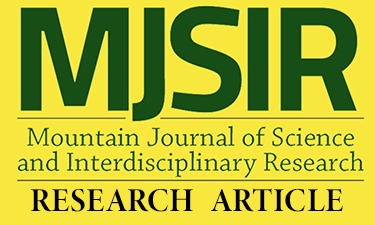Motivated Strategies for Learning and Online Learning Readiness of Students in Maritime Institution in Central Luzon, Philippines
Main Article Content
Abstract
The study examined how motivated strategies for learning contribute to the online learning readiness of Maritime students in a Maritime institution in Central Luzon during the Pandemic School Year of 2021-2022. It also determined the differences in the motivated strategies for learning and online readiness of the respondents when grouped according to sociodemographic characteristics. The respondents of the study were 153 purposively-sampled 2nd year to 4th year maritime students enrolled in the BS Marine Engineering and BS Marine Transportation programs. The descriptive-correlational research design was used in the study. The respondents’ age ranged from 17 to 20 years old, the typical age of students who are in 2nd, 3rd, and 4th years. Majority of the respondents were males because of the common notion that maritime courses are for males. Most were 4th year students enrolled in Bachelor of Science in Marine Engineering. Motivated strategies of the respondents such as rehearsal, elaboration, organization, critical thinking, and metacognition showed high significant relationship with online learning readiness. This finding tends to suggest that the more the respondents use the different motivated strategies for learning, the more they are ready for online learning.
Article Details
References
Battaglia, M.P. (2021). . Sage Research Methods. https://methods.sagepub.com/reference/encyclopedia-of-survey-researchmethods/n419.xml
Chung, E. (2020). Online Learning Readiness among University Students in Malaysia amidst COVID-19, Asian Journal of University Education, 16(20): 46-48. https://eric.ed.gov/?id=EJ1267359
Du, X., Naji, K.K., Tarlochan, F., Ebead, U., Hasan, M.A., & Al-Ali, A.K. (2020).Engineering Students’ Readiness to Transition to Emergency Online Learning in Response to COVID-19: Case of Qatar. Eurasia Journal of Mathematics, Science and Technology Education, 16(10). https://doi.org/10.29333/ejmste/8474
Ferreira, M., Cardoso, A.P., & Abrantes, J.L. (2011). Motivation and Relationship of the Student with the School as Factors Involved in the Perceived Learning. Procedia - Social and Behavioral Sciences, 29: 1707–1714. https://doi.org/10.1016/j.sbspro.2011.11.416
Torun, E.D. (2020). Online Distance Learning in Higher Education: E-learning Readiness as a Predictor of Academic Achievement. Open Praxis, 12(2): 191-208. https://doi.org/10.5944/openpraxis.12.2.1092
Geng, S., Law, K.M.Y., & Niu, B. (2019). Investigating self-directed learning and technology readiness in blending learning environment. International Journal of Educational Technology in Higher Education, 16: 1-22. https://doi.org/10.1186/s41239-019-0147-0
Go, A.N. (2019). Perceived Teachers’ Teaching Styles and Motivated Strategies for Learning of Year 1 and Year 2 Students in Cita Hati Christian Senior High School, Surabaya Indonesia. Distance, Open, and Transnational University, Central Luzon State University, Science City Of Muñoz, Nueva Ecija, Philippines
Human Rights at Sea. (2019). Gender at Sea. https://www.humanrightsatsea.org/gender-at-sea/
Javier, B.S. (2020). Organizational E-Learning Readiness in a State University in Northern Philippines: Inputs for Refining Instructional Quality. TEST Engineering and Management, 82: 5560-5569. https://www.academia.edu/44647462/Organizational_E_Learning_Readiness_in_a_State_University_in_Northern_Philippines_Inputs_for_Refining_Instructional_Quality
Kim, R., Olfman, L., Ryan, T., & Eryilmaz, E. (2014). Leveraging a personalized system to improve self-directed learning in online educational environments. Computers & Education, 70, 150–160. https://doi.org/10.1016/j.compedu.2013.08.006
Karatas, K., & Arpaci, I. (2021). The Role of Self-directed Learning, Metacognition, and 21st Century Skills Predicting the Readiness for Online Learning. Contemporary Educational Technology, 13(3): ep300. https://doi.org/10.30935/cedtech/10786
Kristonis, W.A. (2019). Research Design and Methodology,. Slide Share. https://www.slideshare.net/guestcc1ebaf/research-design-andmethodology
Kumari, K.W.S.N., & Jayasinghe, G.J.M.S.R. (2020). Undergraduate students‘ readiness for blended learning during COVID-19 pandemic in Sri Lanka. SSRN eLibrary. https://papers.ssrn.com/sol3/papers.cfm?abstract_id=3831219
Lasfeto, D. (2020). The relationship between self-directed learning and students’ social interaction in online learning environment. Journal of e-Learning and Knowledge Society, 16(2). https://doi.org/10.20368/1971-8829/1135078
Li, C., & Lalani, F. (2020). The Rise of Online Learning During the COVID-19 Pandemic|World Economic Forum. https://www.weforum.org/agenda/2020/04/coronavirus-education-global-covid19online-digital-learning/
Limniou, M. (2021). Learning, Student Digital Capabilities and Academic Performance over the COVID-19 Pandemic. MDPI. https://www.mdpi.com/2227-7102/11/7/36
Maritime Industry Authority. (2019). MARINA Statistical Report 2015-2019. https://marina.gov.ph/wp-content/uploads/2020/10/2019-MARINA -Statistical-Report.pdf
McGeown, S., Goodwin, H., Henderson, N., & Wright, P. (2011). Gender differences in reading motivation: does sex or gender identity provide a better account? Journal of Research in Reading, 35(3): 328–336. https://doi.org/10.1111/j.14679817.2010.01481.x
Miranda, C. (2020). Generation Z: Re-thinking Teaching and Learning Strategies. Faculty Focus: Higher Ed Teaching & Learning. https://www. facultyfocus.com/articles/teaching-and-learning/generation-z-re-thinking-teaching-and-learningstrategies/
Mohalik, R. & Sahoo, S. (2020). E-Readiness and Perception of Student Teachers' Towards Online Learning in the Midst of COVID-19 Pandemic. SSRN ELibrary. https://papers.ssrn.com/sol3/papers.cfm?abstract_id=3666914
Roesch, E. (2019). Microlearning for Baby Boomers and Generation X: Appeal To Their Frame of Reference. ELearning Industry. https://elearningindustry.com/microlearning-for-babyboomers-and-generation-x
Ronsisvalle, T., & Watkins, R. (2005). Student success in online K-12 Education. The Quarterly Review of Distance Education, 6(2): 117-124. https://eric.ed.gov/?id=EJ874994
Shuttleworth M. (2008). Descriptive research design: Observing a phenomenon. Canada Ontario: Pearson Education, Inc.
Tekkol, I.A., & Demirel, M. (2018). An Investigation of Self-Directed Learning Skills of Undergraduate Students. Frontiers in Psychology, 9. https://doi.org/10.3389/fpsyg.2018.02324
Tempski, P., Arantes-Costa, F.M., Kobayasi, R., Siqueira, M.A.M., Torsani, M.B., Amaro, B.Q.R.C., Nascimento, M.E.F.M., Siqueira, S.L., Santos, I.S., & Martins, M.A. (2021). Medical students’ perceptions and motivations during the COVID-19 pandemic.PLoS ONE, 16(3). https://journals.plos.org/plosone/article?id=10.1371/journal.pone.0248627
Technical Education and Skills Development Authority. (2017). The Philippine Maritime Industry: Through The Years.
https://www.tesda.gov.ph/Uploads/File/planning2017/LMIR/MARITIME%20LMIR%20March%2017%20with%20cover%202017.pdf
Widodo, S., Wibowo, Y., & Wagiran, W. (2020). Online learning readiness during the Covid-19 pandemic. Journal of Physics: Conference Series, 1700(1): 012033. https://doi.org/10.1088/17426596/1700/1/012033
Yeung, A.S., Lau, S., & Nie, Y. (2011). Primary and secondary students’ motivation in learning English: grade and gender differences. Contemp. Educ. Psychol., 36, 246–256. https://doi.org/10.1016/j.cedpsych.2011.03.001
Zoleta, M. (2021). Learning Strategies, Parental Attachment, and Academic Resilience of Wesleyan College of Manila Students during the Pandemic Crisis. [Unpublished doctoral dissertation]. Central Luzon State University.

